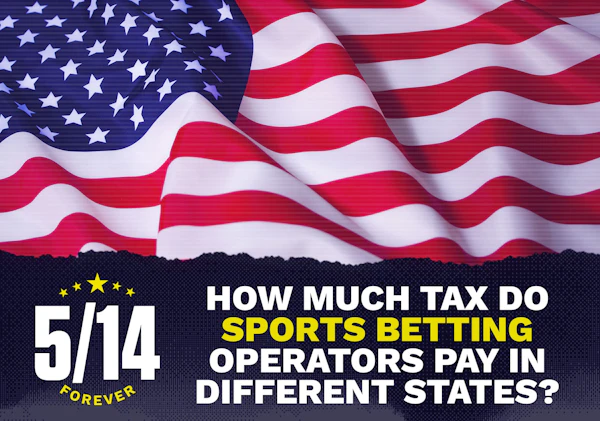How Much Tax do Sports Betting Operators Pay in Different States?

As the legal sports betting industry continues to get off the ground in the United States, sports betting operations are the proverbial guinea pigs in a new experiment in government taxation.
Riding the cover inevitable trial and error these first few years of legalization provides, states are learning how to tax the money that comes through sports gambling companies. And with 30 states and Washington D.C. now allowing sports gambling, the range in taxes varies widely.
Dimers.com contributor Michael Krumholtz takes a look at some of the states whose rates stand out.
Some states have more prohibitive tax rates than others, with New York and New Hampshire, which has only a state lottery system, leading the way at an eye-watering 51 percent. Many other states, however, have a much friendlier tax structure for online sports betting companies, with Nevada and Iowa taxing at just 6.5 percent.
Tax Rates for Legal Online Sports Betting States
New York - 51%
The Empire State has the highest tax rate on sports betting in the country along with New Hampshire. Delaware follows closely behind at 50 percent.
This extremely high tax rate for operators could end up driving them out of the state and looking for futures in states where the tax structure isn’t so rough.
That’s why it’s a risky proposition for the state to keep taxes this high on sports betting, as they may lose out over a long period of time if companies take up their shops and leave.
New Jersey - 14.25%
If operators get fed up with the strict taxes in New York, it’s likely they’ll hop across the Hudson River and set up shop in neighboring New Jersey.
New Jersey’s far more favorable tax rate is good news for those businesses that are looking to see a revival of tourism to Atlantic City, as the casinos there that were long waiting for legalized sports betting are now able to host bettors in person and online.
It’s no surprise that the FanDuel Sportsbook in East Rutherford opened up quickly following the Supreme Court’s landmark 2018 decision.
So far, the Garden State is seeing a year-to-year growth from taxes on sports wagers. In 2021, the state eclipsed $100 million in taxes from the industry, doubling the 2020 figure.
Nevada - 6.75%
The state that paved the way in many respects for the modern landscape of sports betting has, unsurprisingly, one of the lowest tax rates on sportsbooks in the country.
Casinos have been successful over the decades to lobby for friendlier rates and there’s a reason that the sportsbooks in Las Vegas have had so much success.
Reputable operations like Westgate Sportsbook and Wynn Las Vegas helped Sin City take in more than $8 billion in wagers and win $445 million overall in 2021, leading to a cool $30 million in tax revenue for the state last year.
Nevada, however, enforces in-person registration, meaning before they get up and running users must first visit a brick and mortar casino or sportsbook to open an account.
Washington D.C. - 10%
The nation’s capital got in on legalized sports betting rather early, as the city allowed it beginning in 2019. Right now the only mobile option in the city is through the GambetDC app, but there are brick-and-mortar options like William Hill (Caesars) in Downtown DC and MGM in nearby Maryland.
GambetDC is only expected to bring in $1.5 million in tax revenue to the city this year, which is much lower than officials expected when they unveiled their plans for legalized sports betting there.
Both Maryland and Virginia have legalized sports betting as well, however, their tax rates are a tad higher at 15 percent. Though this isn’t as dramatic as the difference in New York and New Jersey, it will be interesting to see the effect it has on businesses in the suburbs beyond D.C.
You can find a full list of the sportsbook and casino tax rates by state at the Tax Foundation’s webpage .
Tax Rates in States with Legal Sports Betting
Retail and Online Tax Rates for Sportsbooks

Related 5/14 Articles: Why the May 14 PASPA Decision was Sports Betting Independence Day
Florida Online Sports Betting in Limbo
Minnesota Online Sports Betting Getting Closer
New Jersey and Sports Betting - So Happy Together
North Carolina is a Sports Betting Sleeping Giant
Massachusetts passes sports betting bill, but hurdles remain
